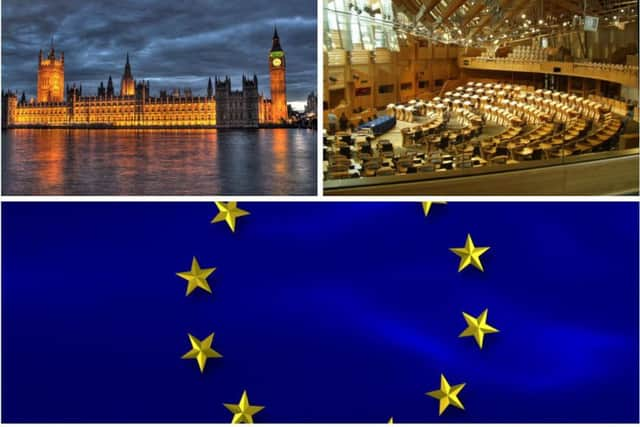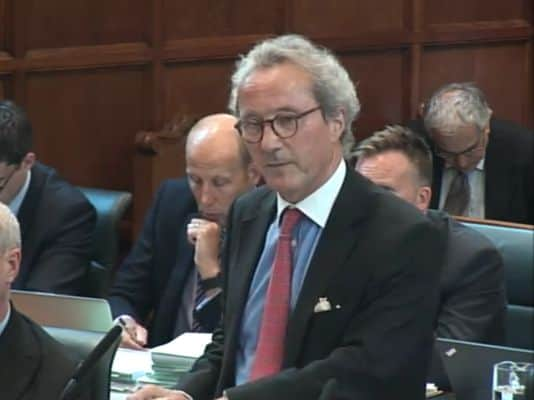Supreme Court Brexit challenge: '˜UK Parliament is sovereign, not Holyrood'
and live on Freeview channel 276
On the first day of a major legal case on the limits of devolution, the UK government’s top law officer for Scotland argued that Holyrood’s Brexit Continuity Bill “cannot stand” and must be struck down.
Lord Keen, the Advocate General for Scotland, told judges at the UK’s highest court that the legislation, passed by MSPs in March following the failure to reach a negotiated solution over post-Brexit devolution, was outside the competence of the Scottish Parliament.
Advertisement
Hide AdAdvertisement
Hide AdResponding for the Scottish Government, Lord Advocate James Wolffe QC insisted that the Continuity Bill does not interfere with the UK’s Brexit negotiations.


Scottish ministers pushed ahead with the Continuity Bill after accusing Westminster of mounting a “power grab” on two dozen responsibilities in devolved areas such as agriculture and the environment, currently held by Brussels.
The legislation was supported by 95 MSPs from all parties except the Conservatives, despite a ruling from the Holyrood Presiding Officer it was not within the competencies of the Scottish Parliament.
UK law officers said they brought the challenge seeking “legal certainty” on which parliament has authority over the disputed powers “in the public interest”.


Advertisement
Hide AdAdvertisement
Hide AdLord Keen told seven justices at the start of the two-day proceedings yesterday “the Scottish Bill as a whole cannot stand”.
He told the justices panel that the bill “impermissibly modifies” Westminster’s EU Withdrawal Bill, which transfers European law into British statute.
Lord Keen said the Scottish Government and Parliament would have been “aware all along” that the Continuity Bill was “plainly and directly inconsistent” with UK Brexit legislation.
Referring to the case taken by Gina Miller against the UK Government over Parliamentary approval for Article 50, Lord Keen quoted the Supreme Court’s own judgement that the withdrawal from the EU is a matter for the UK Parliament and the devolved administrations in the UK do not have a parallel legislative competence in this matter whereas the Sovereign Parliament is “untrammelled” in what it can do.
Advertisement
Hide AdAdvertisement
Hide AdHe said: “The UK Parliament is sovereign, the Scottish Parliament is not.”
By introducing uncertainty over which government will have authority over EU regulations after Brexit, Lord Keen said the Continuity Bill “fundamentally undermines the core purpose” of legislation passed at Westminster.
He described the Continuity Bill as representing a “frustration” of the sovereignty of Westminster to legislate in any area, including in devolved matters, and said it strayed into international treaty negotiations, which are reserved to London.
In their written case, UK law officers argue that the Continuity Bill was passed “without knowledge” of the outcome of negotiations between the UK government and the EU institutions and “pre-empts them”.
Advertisement
Hide AdAdvertisement
Hide AdThey stated: “The effect of what the Scottish Bill does is to make provision for the future relationship with the EU and EU law when that relationship is under negotiation.”
They claim that this “could serve to undermine the credibility of the UK’s negotiation and implementation strategy in the eyes of the EU”.
When details of the case were announced in April, the then attorney general, Jeremy Wright, said: “This legislation risks creating serious legal uncertainty for individuals and businesses as we leave the EU. This reference is a protective measure which we are taking in the public interest.”
Oral arguments from the Lord Advocate will continue today. Submissions will also be heard from the Attorney General for Northern Ireland and the Counsel General for Wales as “interested parties”.
Advertisement
Hide AdAdvertisement
Hide AdIn written submissions to the court, Mr Wolffe stated: “The purpose and effect of the [Continuity Bill] is to promote legal certainty by making provision for the continuity within the domestic legal system of existing EU-derived law upon and following withdrawal.
“Regardless of any treaty on the future relationship which may be entered into between the UK and the EU, there is a need to provide for legal certainty and continuity when the UK leaves the EU in March 2019, and that is the purpose and effect of the Scottish bill.”
The UK and Welsh governments reached an agreement over the terms of post-Brexit devolution to Wales, and Brexit legislation passed by the Welsh Assembly was withdrawn.
